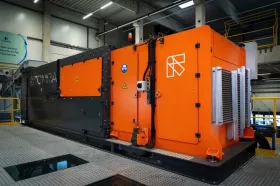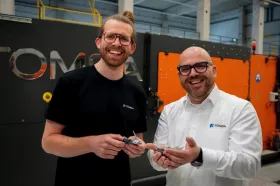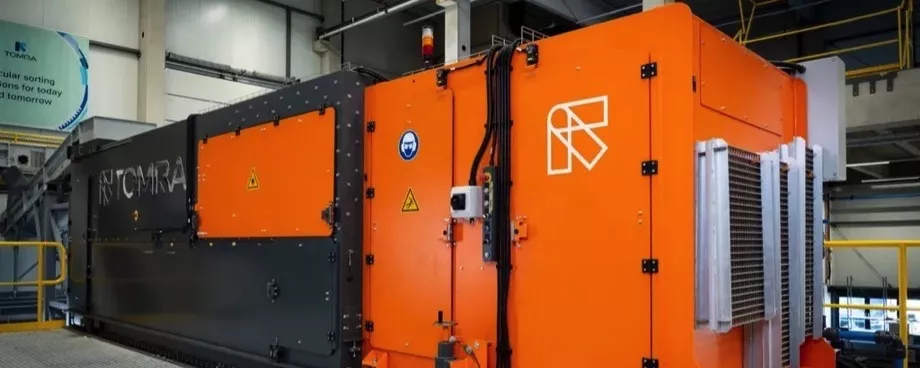
Leveraging decades of experience in the metal recycling industry, the company celebrates its next milestone in the metal segment by introducing AUTOSORT™ PULSE to the market. Equipped with dynamic LIBS technology for high-precision sorting of aluminum scrap by alloy types the new sorting system can be used across a wide range of applications to create high-quality secondary metals.
As the metals industry strives to increase recycling rates to reduce both energy consumption and the use of new materials, the use of best-in-class sorting technology is indispensable. They recover pure mono materials from mixed scrap that can be further processed and turned into virgin-like material with high recycled content. Frank van de Winkel, Market Strategy Segment Manager Metals at TOMRA Recycling Sorting, explains: “Aluminum scrap consists of multiple alloys. Depending on the application, they contain a mix of different alloying metals that define the material’s properties. To recycle a specific alloy without downgrading quality, it must be separated into specific alloy classes – a task that can only be done with the most sophisticated technologies, such as LIBS.
Our team of in-house engineers has dedicated significant time and efforts in the development of this technology to make it excel in performance. AUTOSORT™ PULSE gives recyclers the means to sort aluminum by alloy classes and produce furnace-ready products for demanding applications.”
Next-level Alloy Sorting
AUTOSORT™ PULSE combines leading-edge technology in one machine, enabling high-throughput production of green aluminum. Featuring the patented, dynamic LIBS technology, it delivers outstanding performance in the separation of for example 5xxx and 6xxx aluminum alloys. The machine’s 3D object scanning detects each object regardless of its size and surface while multiple single-point scans enable sharper detection of materials in any condition. Thanks to its AI-based object singulation feature, even overlapping and adjacent objects can be accurately separated to maximize yield.
Conventional sorting machines like x-ray fluorescence (XRF) or standard LIBS technologies are limited in maintaining industry-level throughputs when sorting aluminum alloys. AUTOSORT™ PULSE has a combination of the most innovative technologies, leading to peak precision and high-purity sorting results. Multiple material tests have demonstrated that purity levels of more than 95% can be achieved.
High Volume Processing

With a bulk infeed system and a processing capacity between 3-7 tons/hour, operators can create high volumes of recycled content and thereby meet industrial standards across a wide range of applications.
Operators also profit from TOMRA's proven track record and high safety standards. The AUTOSORT™ PULSE design protects workers from any potentially harmful or penetrating light emissions.
Matthias Winkler, Product Manager at TOMRA Recycling Sorting, states: ”We have a long-standing legacy in the metals segment and our finger is on the pulse of the market. Based on our extensive in-house knowledge, we started developing the dynamic LIBS technology when we sensed alloy separation could help businesses reduce downgrading material. After an extensive innovation phase, we have now extended our product portfolio with AUTOSORT™ PULSE to complement the new generation X-TRACT™.
Customers testing the machine are impressed by its results and the operational benefits it brings. They can run high throughputs and create high-quality products, which gives them access to new material streams and makes them benefit from operational flexibility and a quick return on investment. I strongly believe that AUTOSORT™ PULSE will solve the sorting challenges of tomorrow.”
Data-driven Results
The insights generated from sorting operation data play a critical role in facilitating plant operators' quest to run a profitable business with little to no downtime and maximum output. Available as an additional service for AUTOSORT™ PULSE, the cloud-based data platform TOMRA Insight allows for a data-driven optimization of sorting processes through near-live monitoring. As critical sorting data is available anywhere and anytime, operators can anticipate operational issues and future maintenance requirements and be in control of the entire sorting line.
Supporting Net-zero
Aluminum is a very versatile material that is a highly demanded commodity for the transportation, building and construction and packaging industries, all of which contribute to an unprecedented demand for aluminum. In Europe alone, demand is expected to grow by 40% from 2018-2050 with no signs of a trend reversal.1 At the same time, the aluminum industry is undertaking considerable decarbonization efforts to reach worldwide climate goals, such as those set in the EU and US for 2050.
To bridge the gap between supply and demand and support the transition to a climate-neutral society, the industry resorts to recycled aluminum which comes with a two-fold benefit: on the one hand, recycling aluminum is 95% less energy-intense compared to primary production. On the other hand, it prolongs the lifecycle of already produced materials and gives new value to an abundance of scrap.
When it comes to decarbonizing aluminum, TOMRA’s extensive knowledge of metal recycling and sorting technology is unmatched. Terence Keyworth, Segment Manager Metals at TOMRA Recycling Sorting, states: “Our intensive and long-term collaboration with some of the world’s largest scrap recyclers and aluminum producers is the foundation of our development process. With AUTOSORT™ PULSE and our new generation X-TRACT™, we provide the technological force in driving the aluminum sector’s net-zero transition as it delivers high-quality alloy scrap fractions for producing low-carbon aluminum.”
■





